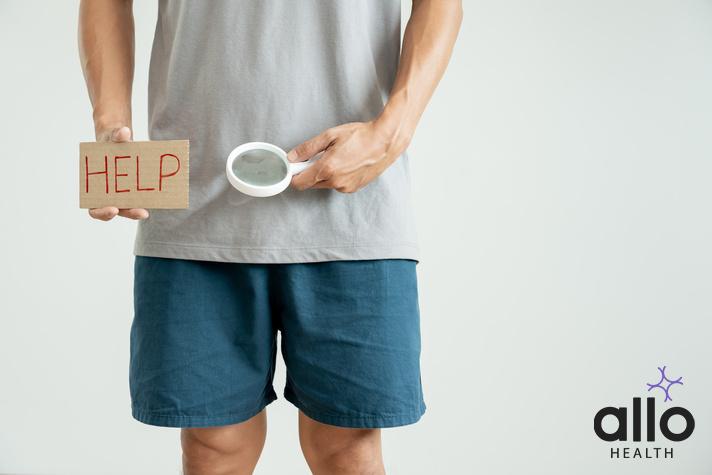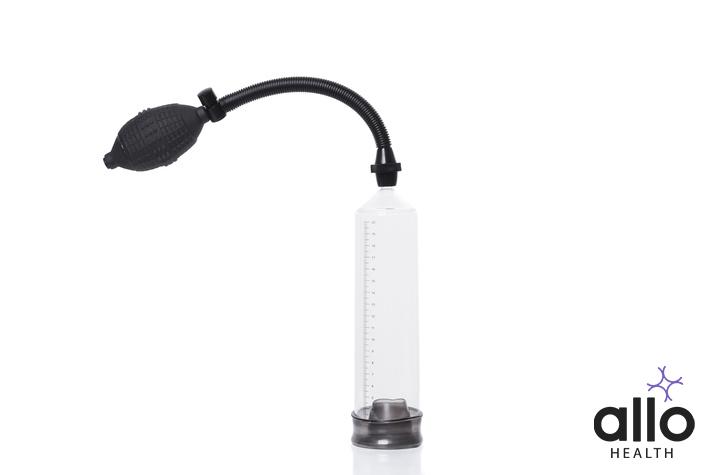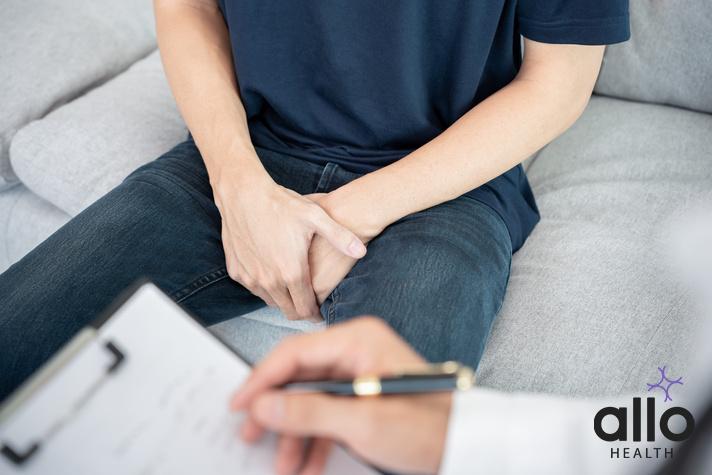7 Causes of Erectile Dysfunction in 20s

Allo Health is dedicated to personalized well-being, offering support and trusted information tailored to individual health goals. The platform emphasizes human-generated content, led by a distinguished medical team of experts, including physicians and sexual health specialists. Their commitment to credibility involves rigorous fact-checking, authoritative research, and continuous updates to ensure accurate, up-to-date information. Allo Health's unique approach goes beyond conventional platforms, providing expert-led insights and a continuous commitment to excellence, with user feedback playing a crucial role in shaping the platform's authoritative voice.

Dr. Aditi completed her undergraduate medical education at AJIMS, Mangalore, after which she worked in multi-speciality hospitals with COVID patients and in the Pain and Palliative medicine department. Driven by her experiences, she developed a keen interest in psychiatry. Dr. Aditi believes that mental health is just as, if not more important, than physical health.
Why This Was Upated?
Our experts continually monitor the health and wellness space, and we update our articles when new information became available.
Updated on 23 January, 2024
- Article was updated as part of our commitment to diversity, equity, and inclusion.

"The following blog article provides general information and insights on various topics. However, it is important to note that the information presented is not intended as professional advice in any specific field or area. The content of this blog is for general educational and informational purposes only.
Book consultation
The content should not be interpreted as endorsement, recommendation, or guarantee of any product, service, or information mentioned. Readers are solely responsible for the decisions and actions they take based on the information provided in this blog. It is essential to exercise individual judgment, critical thinking, and personal responsibility when applying or implementing any information or suggestions discussed in the blog."
Erectile dysfunction (ED) is often associated with older men, but it can also affect younger individuals in their 20s. Understanding the causes and exploring treatment options is crucial for maintaining both sexual and overall health. In this article we’ll get to know about the different causes of erectile dysfunction in 20s and how it differ from those in their 30s.
What is Erectile Dysfunction?
- Erectile dysfunction (ED) is a common sexual disorder in men, characterized by the inability to achieve or maintain an erection sufficient for satisfactory sexual intercourse. This condition can be influenced by a variety of factors, including physical, psychological, and lifestyle concerns.
- Physically, ED can result from concerns with the blood vessels, nerves, or hormones. Common conditions associated with ED include heart disease, diabetes, high blood pressure, and low testosterone levels. The health of blood vessels and blood flow is particularly important, as erections rely on a robust flow of blood to the erectile tissue of the penis.
- Psychologically, factors like stress, anxiety, depression, and relationship problems can contribute to ED. Performance anxiety, where a man worries about his sexual performance, can also lead to or worsen erectile dysfunction.
- Lifestyle choices such as smoking, excessive alcohol consumption, lack of exercise, and a poor diet can also play a role in the development of ED. These factors can affect blood flow and overall health, which in turn can impact erectile function.
- While ED is more common in older men, it can affect individuals of all ages, including those in their 20s. It’s important to address any concerns with a healthcare professional, as ED can sometimes be a sign of underlying health concerns and can often be treated effectively with medication, lifestyle changes, therapy, or other treatments.
Causes of Erectile Dysfunction in 20s
Erectile dysfunction (ED) in the 20s can be attributed to a range of factors, including physiological concerns, psychological conditions, lifestyle choices, and other health-related causes.
-
Blood Vessels and Blood Flow Concerns
- Cardiovascular Disease: Young men with early stages of cardiovascular disease may experience reduced blood flow, impacting erectile function.
- Blood Pressure: High or abnormal blood pressure can affect the flow of blood to the erectile tissue.
-
Hormonal Imbalances
- Testosterone Levels: Lower levels of testosterone can diminish sexual desire and erectile function.
-
Health Conditions and Chronic Diseases
- Diabetes: This condition, especially when unmanaged, can lead to nerve damage affecting erectile function.
- Heart Disease: Heart conditions can impair blood flow and erectile function.
-
Psychological Factors
- Performance Anxiety and Sexual Performance Anxiety: Stress and anxiety about sexual performance can lead to ED.
- Psychogenic Symptoms: Mental health concerns like depression and anxiety disorders can contribute to sexual dysfunction.
-
Lifestyle Factors and Habits
- Alcohol Consumption and Recreational Drug Use: Excessive consumption of alcohol and the use of certain drugs can lead to ED.
- Poor Diet and Lack of Exercise: Unhealthy lifestyle choices can impair sexual health.
- Excessive Pornography: This can lead to unrealistic expectations and performance anxiety.
-
Medication and Substance Use
- Prescription Medications: Some drugs, particularly those for depression and high blood pressure, can have side effects impacting erectile function.
- Recreational Drug Use: Certain drugs can interfere with sexual function.
-
Additional Factors
- Medical Conditions: Various medical conditions, apart from chronic diseases, can influence erectile function.
- Inadequate Sexual Stimulation: Inadequate sexual stimulation can sometimes lead to difficulties in maintaining an erection.
Understanding these causes is the first step in seeking appropriate treatment for erectile dysfunction. Treatments can range from lifestyle modifications, such as regular exercise and a healthy diet, to consulting healthcare providers for medical advice, including exploring options like prescription drug treatments, testosterone therapy, and even surgical options if necessary.
Treatments for Erectile Dysfunction in 20s

Treating erectile dysfunction (ED) in individuals in their 20s involves a multifaceted approach, addressing both physical and psychological factors.
Lifestyle Modifications
- Regular Exercise: Engaging in regular physical activity improves cardiovascular health and blood flow, crucial for erectile function.
- Healthy Diet: A diet rich in fruits, vegetables, and lean proteins can enhance blood flow and overall health, impacting erectile function.
- Reduce Alcohol Consumption: Excessive consumption of alcohol can lead to ED; moderating intake can improve sexual function.
- Managing Stress: Stress reduction techniques like meditation or yoga can alleviate psychological factors contributing to ED.
Medical Treatments
- FDA-Approved Medications: There are several prescription medications available that can effectively treat ED. These work by enhancing the flow of blood to the erectile tissue.
- Testosterone Therapy: If ED is linked to low levels of testosterone, testosterone therapy may be recommended by a healthcare provider.
- Cardiovascular Disease Management: Managing any underlying cardiovascular conditions is crucial as they can significantly impact erectile function.
Psychological Interventions
- Counseling for Sexual Performance Anxiety: Therapy sessions can help in addressing performance anxiety and other psychological factors.
- Treatment for Psychogenic Symptoms: Mental health treatment for concerns like depression and anxiety can improve sexual function.
Devices and Surgical Options
- Vacuum Erection Devices: These devices can induce an erection by increasing the blood flow to the penis.
- Surgical Options: In severe cases, surgical interventions like penile implants might be considered.
Avoiding Risk Factors
- Limiting Prescription Drug Side Effects: Consulting with a healthcare professional to manage any side effects of prescription medications that might impact sexual function.
- Cutting Down on Recreational Drugs: Avoiding recreational drugs that can adversely affect sexual health.
Natural Remedies and Supplements
- While some natural remedies may be suggested, it’s important to discuss these with a healthcare professional to ensure they are safe and effective.
Professional Guidance
- Consulting a Healthcare Provider: It’s essential for individuals experiencing ED to consult with a healthcare provider to identify any underlying medical conditions and to discuss the most appropriate and effective treatments.
By addressing these areas, individuals in their 20s experiencing erectile dysfunction can find effective solutions and improve their sexual health and overall well-being.
Difference Between Erectile Dysfunction in 20s and 30s

Erectile dysfunction (ED) can occur at any age, but the underlying causes and characteristics may differ between men in their 20s and those in their 30s. Here are some key differences:
In Men in Their 20s
- Psychological Factors: Younger men are more likely to experience ED due to psychological concerns such as performance anxiety, stress, and depression. The pressure to perform or inexperience can significantly impact sexual function.
- Lifestyle Choices: Poor lifestyle choices, such as excessive consumption of alcohol, smoking, and use of recreational drugs, are more prevalent causes in this age group.
- Hormonal Imbalances: While less common, hormonal concerns, particularly low testosterone levels, can affect men in their 20s, impacting sexual desire and function.
- Impact of New Relationships: Inexperience or anxiety in new sexual relationships can also contribute to ED in younger men.
- Physical Health Concerns: While less common than in older men, conditions like diabetes, obesity, and high blood pressure can still be factors.
In Men in Their 30s
- Chronic Health Conditions: Men in their 30s may begin to experience more chronic health concerns like diabetes, high blood pressure, and cardiovascular disease, which can all contribute to ED.
- Lifestyle and Aging: As men get older, poor lifestyle choices like a sedentary lifestyle, poor diet, and continued substance abuse can start to have a more significant impact on sexual function.
- Psychological Stressors: Stressors may shift in nature, often related to career, financial responsibilities, or family life, potentially impacting sexual performance.
- Testosterone Decline: While still generally in the normal range, testosterone levels can begin to slowly decline in the 30s, possibly affecting libido and erectile function.
- Relationship Dynamics: Long-term relationship concerns, including reduced sexual desire or other sexual dysfunctions, can become more prominent in this age group.
Conclusion
Erectile dysfunction in your 20s can be a result of various factors, from physical conditions like heart disease to psychological factors like performance anxiety. Consulting a healthcare provider for a proper diagnosis and discussing effective treatments is essential for managing ED and maintaining sexual health. Remember, ED is treatable, and exploring various options can lead to a satisfying sexual life.
Most Asked Questions
-
What can I do if I think I have erectile dysfunction in my 20s?
If you’re experiencing difficulty in getting or keeping an erection, it’s a good idea to talk to a healthcare provider. They can help identify the cause, whether it’s related to your physical health, lifestyle, or psychological factors, and suggest suitable treatment options. Remember, it’s a common concern and nothing to be ashamed of.
-
Can changing my lifestyle really help with erectile dysfunction?
Yes. Simple changes in your lifestyle can make a big difference. Regular exercise, a healthy diet, cutting down on alcohol consumption, and quitting smoking can improve blood flow and overall health, which are essential for a healthy sexual function. These changes not only help with ED but also boost your general well-being.
-
Are there any effective medical treatments for erectile dysfunction in young men?
Yes, there are several effective treatments available. These include FDA-approved medications, testosterone therapy in case of hormonal imbalances, or devices like vacuum erection devices. It’s important to consult a healthcare professional to find out which treatment is best for you, as they can provide personalized advice based on your health condition.
-
Does psychological health affect erectile function?
Definitely. Stress, anxiety, depression, and especially performance anxiety can lead to erectile dysfunction. It’s not just about physical health; your mental and emotional state plays a big role too. If you think psychological factors might be affecting you, consider talking to a mental health professional. Psychological counseling can be very effective in treating ED related to emotional and mental health concerns.






































